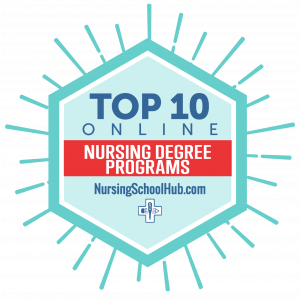
These top online nursing degree programs are from established schools that have traditional nursing programs and now offer online options. For any of you working as nurses right now, you know how busy you are all the time. Going to school to further your education and your career can feel absolutely impossible, but thanks to the incredible variety of schools offering online programs in nursing, it is far from impossible.
Online nursing degree programs offer a host of benefits including better flexibility, accelerated graduation, affordability, and more. After graduating from these programs, the benefits don’t stop, either. You will have more diverse career options in the field of nursing, you will have a stronger knowledge base to help you improve patient outcomes, and in many cases, you’ll see a more robust salary. The online nursing programs we’ve ranked on this list are graduate-level programs for those nurses that are ready to seek new heights.
Methodology
Featured Programs
The online nursing programs in this ranking were ranked based on two essential factors, educational quality, and affordability. Educational quality was calculated using the freshman retention rate and graduation rate. Even though these are not typically considered by graduate students, these two rates are a great representation of the overall quality of a school. These percentages were used as whole numbers and added together to obtain a score out of a possible 200 points.
Affordability was calculated by determining the average cost of attendance and then assigning a score out of a possible 100 points. These two calculated scores were then added together (bringing the total possible score up to 300 points). The nursing programs here are ranked based on the sum of those numbers. We also considered accreditation and any awards or recognition that each program received.
1. University of Florida

The University of Florida is a public research university in Gainesville, Florida. It is one of the largest universities in the country, serving almost 53,000 students and offering over 200 programs of study. UF was founded in 1853 and has grown into a land-, sea-, and space-grant research university with more than 200 different research centers and institutes in operation. The university also houses 16 different colleges and schools with nearly 90 different departments. The UF College of Nursing was established in 1956 and is part of the J. Hillis Miller Health Science Center.
The University of Florida offers a Doctor of Nursing Practice online. Students will have to attend campus for specific courses, but these are presented as intensives and are designed to be minimally intrusive to your other obligations. This program was one of the first of its kind offered in the state, and it is incredibly flexible. Students can enroll either full- or part-time in five different concentrations. Options are Adult-Gerontology Acute Care Nurse Practitioner, Family Nurse Practitioner, Pediatric Acute Care Nurse Practitioner, Pediatric Primary Care Nurse Practitioner, and Psychiatric-Mental Health Nurse Practitioner. The core courses for any of these tracks are 100% online. All of the clinical requirements can be completed at an approved location convenient to you, but some students may end up having to travel for this.
Accreditation & Recognition
UF is accredited by the Southern Association of Colleges and Schools, Commission on Colleges. All of the nursing degree programs are appropriately accredited at all available levels of study by the Accreditation Commission for Midwifery Education and the Commission on Collegiate Nursing Education. U.S. News & World Report has ranked the university among the top 10 best public universities in America. The College of Nursing, in particular, has ranked among the top 30.
Tuition & Fees
The University of Florida received an affordability score of 95. The average cost of attendance is $14,761, which is lower than the current national average.
2. Vanderbilt University

Vanderbilt University is a private research university located in Nashville, Tennessee. It is classified by the Carnegie Foundation as an R1 research university. Vanderbilt was founded in 1873 by the Methodist Episcopal Church, South but cut ties with the church a few decades into its history. The university is organized into ten different colleges and schools through which it offers hundreds of different academic opportunities. Degrees are conferred at all levels in a broad range of fields. Vanderbilt enrolls close to 13,000 students. Among its constituents is the School of Nursing, which opened in 1908.
Vanderbilt University offers an online Doctor of Nursing Practice (DNP) and a PhD in Nursing Science. Each of these degrees has additional areas of concentration. Students can choose from Clinical Research and Health Services Research or Advanced Practice and Executive Leadership. Additionally, the DNP program features primarily asynchronous classes so students can work at their own pace. Also, a capstone project that is required as part of the program. However, students can complete it via live video. For the PhD program, the majority of the classes are synchronous with set times to participate. Most of the classes are held on a weekly basis but are scheduled with consideration to working students. Before graduating, students must go to the campus to defend their dissertation for the PhD option. Both degrees can be completed full-time or part-time.
Accreditation & Recognition
The Southern Association of Colleges and Schools, Commission on Colleges accredits Vanderbilt. It holds many additional accreditations. The Accreditation Commission for Education in Nursing, Inc. formerly accredited several areas, but now just for Vanderbilt’s clinical doctoral programs. Other programs are accredited by the Accreditation Commission for Midwifery Education and the Commission on Collegiate Nursing Education at all offered levels. Vanderbilt’s nursing school has ranked among the top 20 in America for its masters and doctorate programs, per U.S. News & World Report.
Tuition & Fees
Vanderbilt University has an average cost of attendance that is higher than the national average, $23,150. We gave them an affordability score of 85.
3. Johns Hopkins University

Johns Hopkins University was the country’s first research university, and it was founded in 1876. It is a private research university that is in Baltimore, Maryland. There are additional locations in Washington DC, China, and Italy. Johns Hopkins is most highly-regarded for its research; the school was a founding member of the American Association of Universities, which is a prestigious consortium of research institutions. JHU also has been recognized as one of the most cited universities in history. There are well over 100 different programs of study available at the undergraduate and graduate levels, effectively serving a student body of more than 20,000.
The program we have ranked Johns Hopkins for is their Doctor of Nursing Practice program. Three of the concentrations are hybrid programs that include a good bit of face-to-face meetings. These are tracks for Adult-Gerontological Acute Care Nurse Practitioner, Adult-Gerontological Primary Care Nurse Practitioner with HIV, and Family Primary Care Nurse Practitioner with HIV. There are six other NP or CNS degree tracks that feature primarily online coursework with limited campus-based intensives. Other great programs include an MSN, an MSN/MBA dual program, an Executive Track DNP, and an Executive Track DNP/MBA dual program – all of which are 100% at a distance. Many of these various options allow you to complete necessary clinicals locally.
Accreditation & Recognition
Johns Hopkins University is accredited by the Middle States Commission on Higher Education. The university previously held accreditation from the Accreditation Commission for Education in Nursing, Inc. but those ended in 2010. Currently, the Commission on Collegiate Nursing Education accredits the university’s nursing programs at the graduate and doctorate levels. It stopped endorsing the baccalaureate programs in 2016. U.S. News & World Report ranked the School of Nursing as number one in their publication featuring the best nursing schools for master’s degrees in America. The university also stands out because the founder of modern American nursing theory and the world’s first professor of nursing are both alumni.
Tuition & Fees
Johns Hopkins University received an affordability score of 80 points based on its average net price of $27,352. This is higher than average.
4. The Ohio State University

The Ohio State University is a public research university with its main campus in Columbus, Ohio. The inaugural class of students that enrolled in 1873, three years after the school was founded, consisted of just 24 students. Today, what started as the Ohio Agricultural and Mechanical College has grown into one of the nation’s premier research universities that offer degrees at all academic levels in a diverse range of fields. It is also among the largest universities in the country, serving nearly 60,000 students. OSU is a Public Ivy and a member of the Association of American Universities; it was the first school in Ohio to be extended the invitation.
Ohio State Online is the department that handles online degrees, one of which is a Doctor of Nursing Practice. All of the courses in this program are available online, but they are all presented synchronously, which means you will still have to attend classes according to a schedule, you just won’t have to do so in Ohio. You can complete the program in as little as two years of full-time study if you enter with a master’s degree. There are two available concentrations this way, including a Clinical Expert Track and a Nurse Executive Track. There is a BSN to DNP option that can take four or five years depending on whether you can commit to full-time study or only part-time. Ten concentrations are offered for BSN-DNP students, but the specialization-specific courses can only be completed face to face.
Accreditation & Recognition
OSU has been accredited by the Higher Learning Commission since the year 1913. Previously, the university held accreditation from the Accreditation Commission for Midwifery Education, from 1996 until 2017. Currently, the university’s nursing programs are accredited by the Commission on Collegiate Nursing Education at all offered levels. In 2018, U.S. News & World Report ranked the DNP at the university as 5th in the nation.
Tuition & Fees
OSU’s average cost is $17,971 a year, which is only slightly higher than average. We gave them an affordability score of 90 points.
5. Indiana University-Bloomington

Indiana University-Bloomington is a public research university and is the flagship institution of the Indiana University System. It is located on a nearly 2,000-acre campus in Bloomington, Indiana, and serves a student body of 43,710. It is the largest school in its system. IU was founded in 1820 as the State Seminary. In less than two decades, it was granted university status and took on its current name. Even though it was founded as a seminary, the university is nonsectarian. IU is a member of the AAU and is considered to be a Public Ivy institution. There are 17 colleges and schools that comprise the university.
Indiana University offers a Doctor of Nursing Practice online that is only open to MSN nurses. It focuses on leadership in advanced practice, preparing graduates to take leadership roles in their area of specialization. This is a 37-credit program. There is also an online PhD in Nursing Science program that stands out for the fact that it is open to nurses only holding a BSN in addition to the typical MSN. The PhD program consists of 90 credits and covers leadership as well as other topics in nursing theory, analytics, and more to strengthen your research skills so you can drive forward the future of nursing. Both of these programs will be completed in a cohort model, and you can do all of your coursework online. The university states that there are face-to-face meetings required, but they are minimal and strategically scheduled to cause as little disturbance as possible.
Accreditation & Recognition
The Higher Learning Commission currently accredits the university as a whole. There are currently no documented programmatic accreditations in nursing. The National League for Nursing recognized IU as a Center of Excellence in two categories for creating environments that Promote the Pedagogical Expertise of Faculty and Advance the Science of Nursing Education. U.S. News & World Report ranks the school among the top 50 master’s programs, doctorate programs, and online programs in nursing in America.
Tuition & Fees
Indiana University-Bloomington received an affordability score of 95 points. The annual net price is $12,621, which is lower than the national average.
6. Indiana University-Purdue University-Indianapolis

Indiana University-Purdue University-Indianapolis or IUPUI is a member of both the Purdue University and Indiana University Systems. It is a public research university in Indianapolis, Indiana. It was founded in 1969 by merging the extension programs offered by Purdue and IU in the city of Indianapolis. Today, the institution encompasses 18 colleges and schools through which it provides over 200-degree programs. Degrees are conferred at both the undergraduate and graduate levels. The majority of the students are undergraduates.
IUPUI features the same two online programs in nursing as Indiana University-Bloomington. Students with a Master of Science in Nursing can enroll in the Doctor of Nursing Practice. This DNP prepares APRNs for leadership roles. It is 37 total credits and can be completed in as little as two years. The other program is a PhD in Nursing Science, which is a 90-credit program. Unlike a lot of PhD programs, this one allows entry to those who only have a BSN. This is a research-focused degree that is perfect for those who want to have stronger influences in the academic environment of nursing and the design and operation of health systems, as well as clinical science. If you enter with a BSN, you can earn a CNS certification throughout your study. Courses are available 99% online.
Accreditation & Recognition
Indiana University-Purdue University-Indianapolis is accredited by the Higher Learning Commission. Currently, nursing programs offered at the bachelor’s, master’s, and doctorate levels are accredited by the Commission on Collegiate Nursing Education. In the past, the Accreditation Commission for Education in Nursing, Inc. endorsed programs at IUPUI but resigned in 2016. IUPUI is home to the largest school of nursing in the country. U.S. News & World Report has ranked its nursing programs among the top 30 in America. The National League for Nursing considers the school a Center of Excellence in Nursing Education. It is a highly-regarded research center and has received multiple NIH grants. The university is also a member of the American Association of Colleges of Nursing.
Tuition & Fees
IUPUI’s average cost of attendance comes in well below the national average at $10,538 per year. We gave them an affordability score of 95 points.
7. University of Pittsburgh

The University of Pittsburgh is a public research university in Pittsburgh, Pennsylvania. Official sources claim that the school was founded in 1781, but there is evidence that it may have begun as early as 1770. It was established as a prep school, but there was a developing need for more advanced education, and thus, the school became a university in 1819. It wouldn’t adopt its current name until 1908, though. Almost 29,000 students are enrolled at the university, which is made up of 17 different colleges and schools. Pitt is a member of the Association of American Universities and has been ranked both nationally and internationally for its value and academic excellence by a variety of publications.
Pitt has one online nursing program, a Doctor of Nursing Practice. There are ten optional areas of specialization for students to have a more professionally-tailored degree as well, these are Clinical Nurse Specialist – Adult-Gerontology, Clinical Nurse Specialist – Psychiatric Mental Health, Health Systems Executive Leadership, CRNA MSN to DNP Nurse Anesthesia, Adult-Gerontology Acute Care, Adult-Gerontology Primary Care, Family (Individual Across the Lifespan), Neonatal, Pediatric Primary Care, and Psychiatric Mental Health Nurse Practitioner. This is a post-master’s program only. The University of Pittsburgh is the best option for any of you who are particularly concerned about traveling. 100% of the program can be completed at a distance. All your coursework is online, all of your clinicals can be completed locally at an approved location, and any exams you need can be proctored at an authorized testing center near you. You will never have to travel.
Accreditation & Recognition
The University of Pittsburgh has its institutional accreditation from the Middle States Commission on Higher Education. Nursing programs in a variety of areas are appropriately accredited by the Accreditation Commission for Midwifery Education, and the Commission on Collegiate Nursing Education. The Council on Accreditation of Nurse Anesthesia Educational Programs formerly accredited graduate-level programs in Nurse Anesthesia at the university but stopped in 2010.
Tuition & Fees
The University of Pittsburgh was awarded an affordability score of 85 points. This is based on the $23,572 cost of attendance, which is reasonably higher than the national average.
8. University of Massachusetts Amherst

The University of Massachusetts Amherst is a public research university in Amherst, Massachusetts. It is the flagship university of its system and is recognized as the largest institution of higher education in its region. There are nine academic constituents of UMass, which offer a combined total of 233 different degree programs. The student body totals just over 30,000. The university was founded in 1863, but it struggled greatly in its formative years. It didn’t even enroll any students until 1867. Now, UMass is a powerhouse of a university, classified with the Carnegie Foundation’s highest distinction for its research and ranked among the top 30 best public universities across the country.
UMass Amherst was one of the first universities to create a BSN to DNP program. Typically, you must have earned a master’s degree to gain entry to a doctorate program, but with this, those holding bachelor’s degrees are accepted as well. Specialty tracks include Family Nurse Practitioner, Public Health Nurse Leader, Adult/Gerontology Primary Care Nurse Practitioner, or Psychiatric Mental Health Nurse Practitioner. The program has been awarded for its excellence in online education at the regional and national levels. The only option for students who have already progressed their training beyond a BSN is a DNP completion program designed for APRNs holding a Master of Science in Nursing. Instead of choosing a program of study, instead, students will submit a portfolio including all of their prior academic experience, work training, and professional experience so that an advisor can help them put together a relevant, individualized curriculum.
Accreditation & Recognition
The University of Massachusetts-Amherst is accredited by the New England Commission of Higher Education. The university offers nursing programs at the undergraduate and graduate levels, and they are all accredited by the Commission on Collegiate Nursing Education.
Tuition & Fees
UMass Amherst costs $20,093 per year, which is still relatively high compared to the average price of $15,523. We gave them an affordability score of 85 points.
9. George Washington University

George Washington University is a private research university located in our nation’s capital. It was founded in 1821 based on the desires of George Washington himself. It is one of the few universities in America to have been established by a congressional charter. Another thing that makes the university stand out is that the majority of its 27,973 students are studying at the graduate level. GWU offers degrees at all academic levels, though, in a total of 71 different disciplines. The university draws students from all 50 states and more than 100 foreign countries. It is famous for its incredibly distinguished and successful alumni as well as for being one of the most expensive universities in America. However, there are tuition guarantees and exceptional financial aid opportunities.
George Washington University has a smaller selection of options comparatively, but it is an institution with a very esteemed reputation that offers a world-class education. There is a traditional post-master’s DNP program that has three focus areas you can choose from, Executive Leadership, Health Care Quality, or Nursing Practice. You will have to attend campus three times in total to meet all the requirements to graduate. There is also a BSN to DNP track with focus areas in Adult-Gerontology Acute Care Nurse Practitioner, Adult-Gerontology Primary Care Nurse Practitioner, or Family Nurse Practitioner. This program also features minimal on-campus visits. Depending on which program is best suited for your goals, you may be able to take it at a part-time pace.
Accreditation & Recognition
The Middle States Commission on Higher Education accredits GWU as a whole. The nursing degree programs at the university are accredited at every level by the Commission on Collegiate Nursing Education.
Tuition & Fees
George Washington University is considered among the most expensive universities in America, with an average cost of $39,562. This is more than double the national average, so they were awarded an affordability score of just 70 points.
10. Creighton University

Creighton University is a private Jesuit university in Omaha, Nebraska. It was founded in 1878 when it opened its doors to just 100 students under the name Creighton College. At that time, Creighton was a men’s-only school, but it went on to become coeducational in 1951. University status was granted in 1958. There are over 8,000 students in attendance today, divided among the nine colleges and schools that make up the university. There are more than 50 areas of study to choose from, leading to degrees at the associate, bachelor, master’s, and doctorate levels.
Creighton University offers a Doctor of Nursing Practice distance-learning program to both BSN- and MSN-holding nurses looking to further their education. The program is available entirely online. Their offerings in this particular program are some of the most comprehensive on this list. There are four concentrations in the DNP program, six APRN tracks you can take, and a Clinical Systems Administration track that also comes in three different concentrations. Because of this extensive list, there is a broader range of elective and specialty courses available, which allows you to gain the knowledge and skills you know will benefit you, your career, and your patients the most. Regardless of what you choose, the program has been designed to seamlessly combine practical skills with advanced scientific knowledge, all while preparing students for leadership positions within their roles.
Accreditation & Recognition
Creighton University is accredited by the Higher Learning Commission. Nursing degree programs at the baccalaureate, master’s, and doctorate levels offered at the university are all accredited by the Commission on Collegiate Nursing Education.
Tuition & Fees
Creighton University received an affordability score of 75 points based on the annual net price of $30,353, which is close to twice as much as the average.
Online Nursing Degree Programs
Nursing is the largest area of the medical field, and there is a constant shortage of qualified nurses to fill the millions of jobs out there right now. By continuing your education, you can rise to the challenge of filling those positions. If that’s an aspiration that you have, studying online can help you reach those goals without compromising your current job or other obligations.
Related: